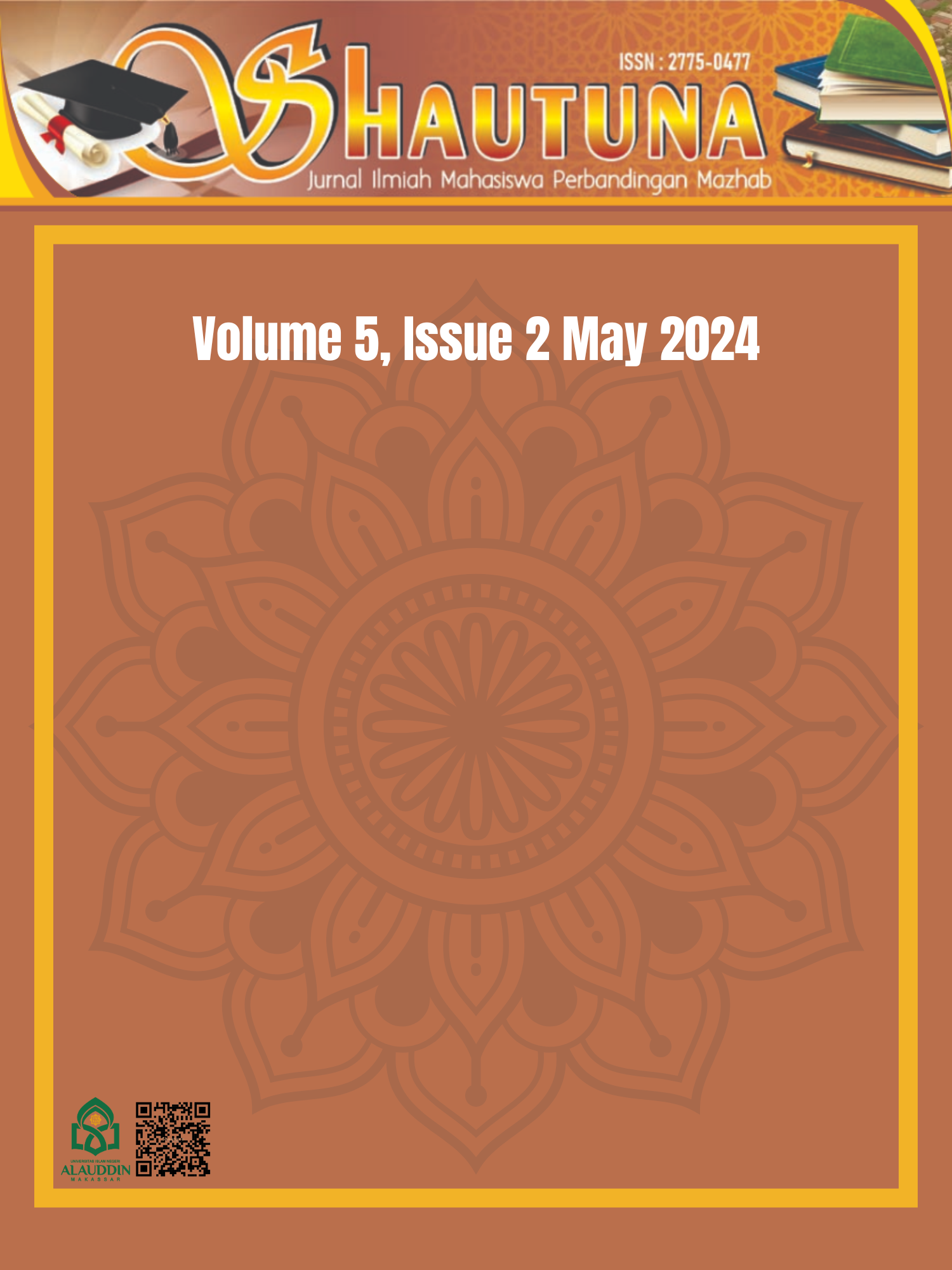Methods of Legal Guidance for Children Who Are Not Legally Capable at the Maros Special Children's Development Institution II
Analysis of Madhab Fiqh
DOI:
https://doi.org/10.24252/shautuna.v5i2.42491Keywords:
Coaching Methods, Children Not Yet Legal, Schools of JurisprudenceAbstract
The main problem in this research is how the legal guidance process for children who are not yet legally competent is implemented at the Special Children's Development Institute II Maros and what is the impact of legal guidance on children who are not yet legally competent at the Special Children's Development Institution II Maros according to the school of jurisprudence. The research method used in this research is sociological legal research by conducting direct interviews. Meanwhile, this type of research is included in field research, namely research that has been carried out directly at the object, especially in an effort to collect data and various information by describing in detail the implementation of coaching at the II Maros Children's Special Development Institute. The research results obtained show that the concept of coaching methods applied by the Special Children's Development Institute II Maros is divided into three, including: Independence Development. Religious Development, and Skills Development. According to Imam Syafi'i, applying coaching methods to children who are not yet competent by providing education and teaching has a good impact so that children can understand and practice Islamic teachings. Meanwhile, according to Imam Maliki's opinion, the application of coaching methods to children who are not legally competent by providing advice and guidance has a good impact. The implication of the research is that when applying the coaching method to children who are not legally competent, they still provide coaching using the advice method, but it is done gently so that the child can easily accept it in accordance with the Imam Maliki school of thought and the coaching method for developing knowledge should be given learning in the form of providing basic material so that the children being coached receive educational simulations. the same as the level of education in public schools.
References
Aisyah, Nur. “Dispensi Pernikahan Di Bawah Umur Pada Masyarakat Islam Di Kabupaten Bantaeng.” Jurisprudentie : Jurusan Ilmu Hukum Fakultas Syariah Dan Hukum 4, no. 2 (2017): 174–88. https://doi.org/https://doi.org/10.24252/jurisprudentie.v4i2.4062.
Almond, Douglas, Janet Currie, and Valentina Duque. “Childhood Circumstances and Adult Outcomes: Act II.” Journal of Economic Literature 56, no. 4 (2018): 1360–1446. https://doi.org/10.1257/jel.20171164.
Arianto, Saeful, Sabri Samin, and Dea Larissa. “Perlindungan Terhadap Anak Korban Kecanduan Game Online: Studi Kasus Di Kota Makassar.” Siyasatuna: Jurnal Ilmiah Mahasiswa Siyasah Syar’iyyah 3, no. 3 (2022): 589–98. https://journal3.uin-alauddin.ac.id/index.php/siyasatuna/article/view/24858.
Ihsan, Ihsan, and Muhammad Anis. “Pola Pembinaan Anak Yatim Perspektif Hukum Islam Dan Undang-Undang Perlindungan Anak; Studi Kasus LKSA Di Panti Asuhan Amrillah Kab. Gowa.” Shautuna: Jurnal Ilmiah Mahasiswa Perbandingan Mazhab 2, no. 2 (2021): 397–420. https://doi.org/https://doi.org/10.24252/shautuna.v2i2.19146.
Irwanto. “Analisis Konsep Perlindungan Anak Dan Implementasinya Di Indonesia: Kajian Awal”, Save The Children. Jakarta: IRW-MELISA, n.d.
Jannah, Miftahul. “Merefleksikan Pembinaan Bagi Anak Di Lembaga Pembinaan Khusus Anak Kelas II Maros.” Jurnal Living Law 14, no. 1 (2022): 75–86. https://doi.org/10.30997/jill.v14i1.4944.
Jayadi, Ahkam. “Membuka Tabir Kesadaran HUkum.” Jurisprudentie : Jurusan Ilmu Hukum Fakultas Syariah Dan Hukum 4, no. 2 (December 2017): 11–23. https://doi.org/10.24252/JURISPRUDENTIE.V4I2.4041.
Jufri, Andi Takdir. “Pencurian Yang Dilakukan Oleh Anak Di Kota Palopo.” Jurisprudentie 3, no. 1 (2016): 22–32. https://doi.org/https://doi.org/10.24252/jurisprudentie.v3i1.3620.
Kansil. Tindak Pidana Dalam Undang-Undang Nasional. Jakarta: Jala Permata Aksara, 2009.
Khoiruddin, M. Arif. “Pendekatan Sosiologi Dalam Studi Islam.” Tribakti: Jurnal Pemikiran Keislaman 25, no. 2 (2014): 348–61. https://doi.org/10.33367/TRIBAKTI.V25I2.191.
Krisnamurti, Hana. “Kebijakan Sistem Pertanggungjawaban Pidana Anak Dalam Rangka Perlindungan Hukum Bagi Anak Yang Berhadapan Dengan Hukum.” Wacana Paramarta: Jurnal Ilmu Hukum 19, no. 2 (October 31, 2020): 111–20. https://doi.org/10.32816/paramarta.v19i2.91.
Lintjewas, Mariany M, and Fahri Bachmid. “Sistem Pemasyarakatan Terpidana Anak: Studi Di Lembaga Pembinaan Khusus Anak (LPKA) Kelas II Maros.” Journal of Lex Generalis (JLS) 3, no. 4 (2022): 648–63. https://doi.org/10.52103/jlg.v3i4.
Mapuna, Hadi Daeng. “ISLAM DAN NEGARA (Sebuah Catatan Pengantar).” Al Daulah: Jurnal Hukum Pidana Dan Ketatanegaraan 6, no. 1 (2017): 156–63. https://doi.org/https://doi.org/10.24252/ad.v6i1.4872.
Muharram, Andril, Abdul Wahid Hadedde, and Andi Fadli Natsif. “Pertanggungjawaban Hukum Terhadap Anak Yang Melakukan Tindak Pidana Pembunuhan; Analisis Perbandingan Hukum Pidana Islam Dan Positif.” Shautuna: Jurnal Ilmiah Mahasiswa Perbandingan Mazhab 2, no. 3 (2021): 721–25. https://doi.org/10.24252/shautuna.v2i3.19332.
Downloads
Published
How to Cite
Issue
Section
License
Copyright (c) 2024 Annisa Intan Pratiwi, Nur Aisyah, Ilham Laman

This work is licensed under a Creative Commons Attribution 4.0 International License.









